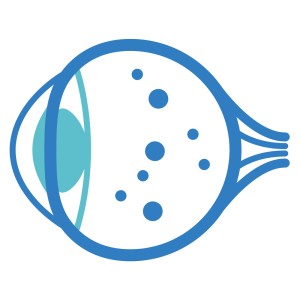Eye Floaters – What they are and what remedy can you use
 What are eye floaters?
What are eye floaters?
Floaters are small dark shapes that float across your vision. They can look like spots, threads, squiggly lines, or even little cobwebs.
How to Address Floaters
70% of the population has eye floaters. An eye floater is a strange little cobweb-like piece of something drifting in your eye. It tends to float around, especially if you try to focus on it or if you look away. It’s not dangerous, but it’s very annoying.
It’s really a piece of collagen fiber that creates a shadow in the back part of the eye (the retina) that gives you this image. This typically comes from some sort of breakdown tissue in the eye from internal bleeding or some type of inflammation. In many cases, this happens as a part of the aging process. It could be from some old injury, infection, or a blood sugar situation.
The best natural remedy for eye floaters is autophagy. Autophagy is a condition where the body is recycling old and damaged proteins. The biggest thing that stimulates autophagy is fasting. In my opinion, a combination of intermittent fasting and periodic prolonged fasting would be the best thing you could do to help get rid of eye floaters. Autophagy may have many other benefits as well.
Intermittent Fasting: – Intermittent fasting gives the body adequate time to clean up and remove toxins from the body, which it cannot do with an all-day grazing diet Time restricted it limits the time to eat to 6 hours or 8 hours. by Dr. Eric Berg
DIET Changes
Collagen and Sugar Molecules
Damaged collagen fibers clump together, forming these pesky floaters. Additionally, sugar molecules attach themselves to proteins through glycation, forming more floaters. To get rid of them naturally involves addressing both issues.
While some people may find their appearance annoying; they usually don’t pose a threat to sight.
Antioxidants
Ever wonder why rust doesn’t form on stainless steel? That’s because it contains chromium, a powerful antioxidant that protects the metal. Similarly, our eyes need antioxidants to keep them in peak condition and fight off harmful effects such as glycation.
Antioxidants and Eye Health
When you think about maintaining eye health, vitamins A, C, and E immediately come to mind. But there’s more than just these three big guns. Other players like zinc and selenium contribute significantly by boosting your body’s natural defenses against oxidative stress.
According to research, higher dietary intake of nutrients with antioxidant properties is linked with a lower risk of developing advanced age-related macular degeneration—a leading cause of blindness for people over 60. Eating nutrient-rich foods or considering supplements if necessary—so those pesky floaters can become an old story.
Anti-Glycation Remedies for Floaters
There are natural remedies to help fight those annoying eye floaters. These nutrients, such as choline, inositol, methionine, and L-lysine, are essential to combat eye floaters. They’re naturally occurring substances that your body needs.
Choline, Inositol, and Methionine
Choline, a key component of cell membranes, can support eye health when taken in recommended dosages. Inositol, often referred to as vitamin B8, also plays an essential role in maintaining the health of your eyes’ nerve cells.
But let’s not forget methionine. This sulfur-containing amino acid is vital for many bodily functions, including vision.
The Potential of L-Lysine
Beyond these three gems lies another potential savior – L-Lysine. A study from the Journal of Ophthalmology shows promising results with this amino acid improving symptoms related to eye floaters.
We need more research into how we use nutrition to tackle these irritating intruders once and for all.
The Impact of Diet and Fasting on Eye Floaters
Did you know that what you eat can influence eye floaters? Like the low-carb ketogenic diet, your diet is crucial in managing these pesky vision disturbances.
The Low-Carb Ketogenic Diet
This high-fat, low-carb lifestyle change has been linked with reducing eye floaters.
This effect could be particularly beneficial for individuals with diabetes, who often have an increased risk of developing such conditions due to high blood sugar levels damaging their eyes’ delicate tissues over time.
The Role of Vitamin C and Zinc in Reducing Floaters
Vegetables High in Vitamin C
Vitamin C, an antioxidant, can assist in shielding our eyes from harm. Consuming vegetables high in vitamin C, like bell peppers, kale, and broccoli, might help keep those annoying eye floaters at bay.
This isn’t some hocus pocus magic trick – it’s backed by science. Getting enough vitamin C contributes to maintaining the health of our retina, where these pesky floaters originate.
Meats and Seafood Rich in Zinc
Zinc also holds a powerful punch when fighting off eye floaters. It aids healing processes within the body, including the repair of damaged collagen fibers, which cause those shadowy specks.
Zinc-rich foods include meats like beef or lamb and seafood options like oysters or shrimp.
Taking this natural approach towards combating eye floaters not only provides nutritional benefits but might also reduce reliance on potential surgical procedures for severe cases.
Conclusion
Diet changes plus periodic fasting or low-carb keto regimens may have a significant influence here.
Vitamin C-rich veggies and zinc-packed meats were highlighted as dietary additions for their anti-glycation effects.
In essence, battling those bothersome eye floaters might not require drastic measures but simple tweaks in our diet and lifestyle. Remember – Knowledge is Power!
Is your body absorbing and utilizing the vitamins?
Address your Metabolism and thus digestion What is Metabolism?
Supporting Data
https://pubmed.ncbi.nlm.nih.gov/12824944/
https://www.ncbi.nlm.nih.gov/pmc/articles/PMC8525826/
https://www.ncbi.nlm.nih.gov/pmc/articles/PMC4825899/
Data:
https://www.nhs.uk/conditions/floaters-and-flashes-in-the-eyes/
https://www.ncbi.nlm.nih.gov/books/NBK470420/
https://www.nei.nih.gov/learn-about-eye-health/eye-conditions-and-diseases/floaters
https://my.clevelandclinic.org/health/articles/14209-floaters–flashers
https://assileye.com/conditions/retina/eye-floaters-flashes
https://pubmed.ncbi.nlm.nih.gov/26679984/
STILL HAVE QUESTIONS? EMAIL AND GET YOUR QUESTIONS ANSWERED.
Sign up to receive the MCVitamins Newsletter!
Up-to-date info on the latest health-related news happening in the world
(available in English only)

